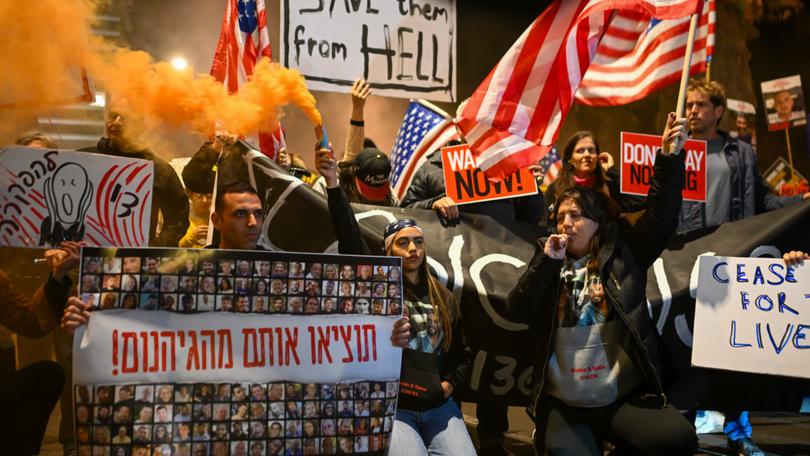Biden places onus for Gaza ceasefire deal on Hamas but wants more aid as humanitarian crisis looms
Negotiators are trying to secure a 40-day ceasefire in Hamas’ war with Israel in time for the Muslim fasting month of Ramadan, which begins next week.

US President Joe Biden says a deal for a ceasefire in the Gaza Strip in exchange for the release of Israeli hostages is in the hands of Hamas, as delegations held a third day of talks with no sign of a breakthrough.
Negotiators from the Palestinian militant group, Qatar and Egypt - but not Israel - are in Cairo trying to secure a 40-day ceasefire in Hamas’ war with Israel in time for the Muslim fasting month of Ramadan, which begins early next week.
The deal presented to Hamas would let some hostages captured by Palestinian militants in the October attack that precipitated the war go free, while aid to Gaza would be increased to try to avert famine as hospitals treat acutely malnourished children, and Hamas would provide a list of all the hostages held in Gaza.
Sign up to The Nightly's newsletters.
Get the first look at the digital newspaper, curated daily stories and breaking headlines delivered to your inbox.
By continuing you agree to our Terms and Privacy Policy.Israel for its part wants merely a pause in fighting to get hostages out of Gaza and more aid in, insisting that it will not end the conflict before Hamas is “eliminated”.
Government spokesman Avi Hyman told a briefing before Hamdan spoke that the Islamist movement would have to “come down from their delusional positions and come into our orbit”.
He added: “Hamas understands military pressure and we are bringing it to them.”
Washington, Israel’s main political and military backer and a sponsor of the talks, also put the onus squarely on Gaza’s rulers.
“It’s in the hands of Hamas right now. Israelis have been cooperating. There’s been a rational offer,” Mr Biden told reporters on Tuesday.
“If we get to the circumstance that it continues to Ramadan ... it’s gonna be very dangerous.”
Palestinian-Israeli violence in Israel and the occupied Palestinian territories often spikes during Ramadan, as does hostility towards Israel in the Arab and Muslim world, creating a strong incentive for leaders to clinch a deal before then.
Hamas says Washington’s stance is designed to deflect blame from Israel if the talks collapse.
The United States has also urged Israel to do more to alleviate the humanitarian catastrophe in Gaza, where more than 30,000 Palestinians have been killed by Israel’s assault, launched after Hamas attacks that killed 1,200 people in October.
“We must get more aid into Gaza,” Biden said.
US Secretary of State Antony Blinken said this also meant “making sure it can get to the people who need it ... the situation as it stands is simply unacceptable.”
Mr Biden, who has said the “aid flowing to Gaza is nowhere nearly enough”, added taht the outbreak of violence near a besieged convoy of aid trucks which left scores dead last week could set back the ceasefire talks between Israel and Hamas, which is designated a terror group by the US and European Union.
Famine is looming over the Gaza Strip as aid supplies, already sharply curtailed since the start of the war, have dwindled to barely a trickle over the past month. Swathes of the territory are completely cut off from food. Gaza’s few functioning hospitals, already overwhelmed by the wounded, are now filling with children starving to death.
The situation is worse in the north of Gaza, beyond the reach of aid agencies or news cameras. Gaza health authorities say 15 children have now died of malnutrition or dehydration at one hospital.
The US military, in coordination with Jordan, airdropped 36,000 meals into northern Gaza on Tuesday, a program Washington began last week. Aid agencies say this is paltry compared to the scale of the hunger.
In a post on X, Mr Biden said: “The United States is committed to pulling out every stop to get more aid to those in Gaza who desperately need it. We won’t stand by. We won’t let up.”
Israel says it is prepared to let in more aid through the two checkpoints on the southern edge of Gaza that it has permitted to open, and blames UN and other aid agencies for failing to distribute it more widely.
The agencies say this has become impossible with a breakdown of civil administration and law and order, and that it is up to Israel, whose troops have stormed Gaza’s towns and patrol them, to provide access and security for food distribution.
“The sense of helplessness and despair among parents and doctors in realising that lifesaving aid, just a few kilometres away, is being kept out of reach must be unbearable,” said Adele Khodr, UNICEF regional director for the Middle East and North Africa.
